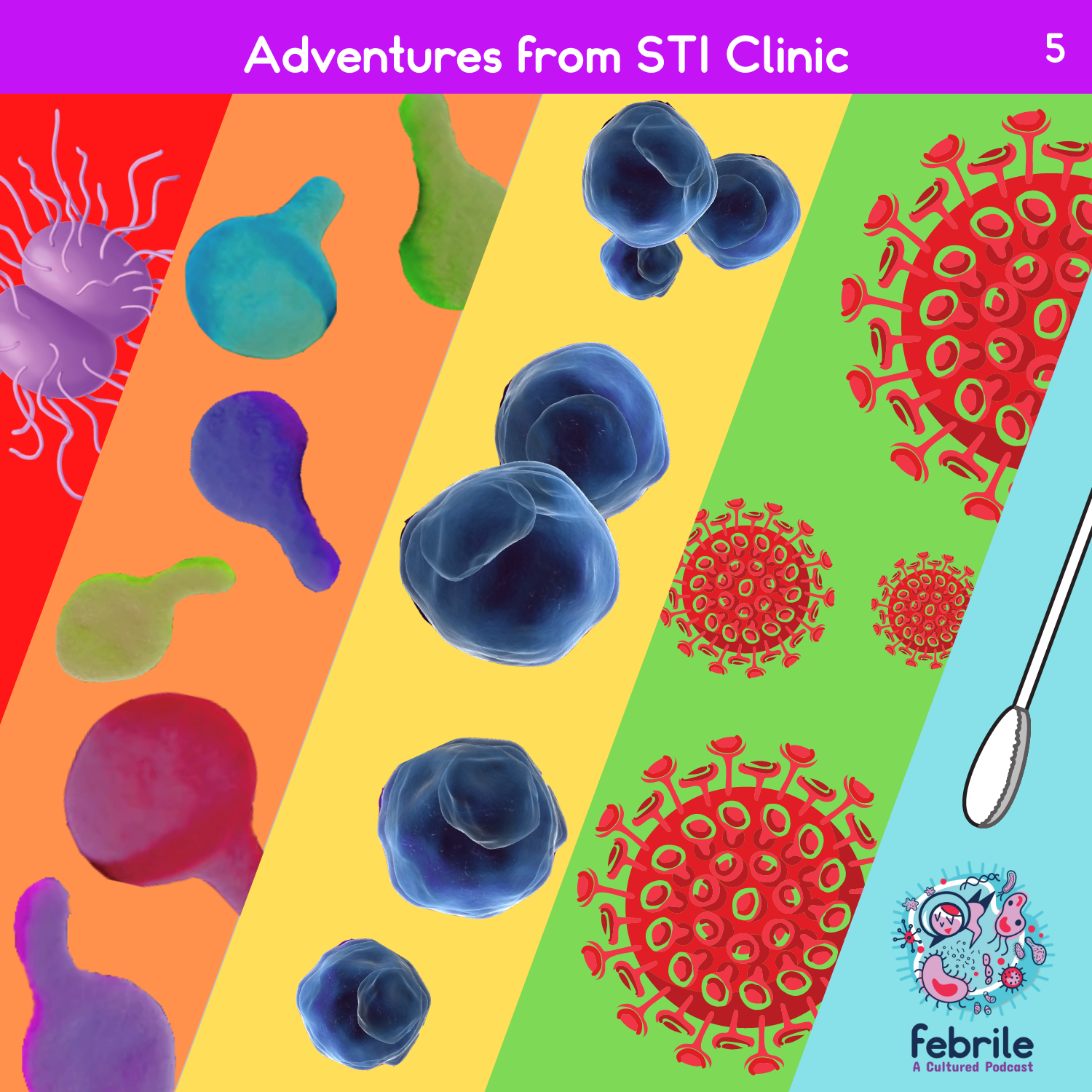Credits
Host: Sara Dong
Guest: Anu Hazra
Writing/Producing/Editing/Cover Art: Sara Dong
Infographics: Elise Merchant, Sara Dong
Dr. Anu Hazra is an Assistant Professor in the Section of Infectious Diseases and Global Health at the University of Chicago and Director of STI Services at the Chicago Center of HIV Elimination. In addition to his work at UofC, he is also co-Medical Director of Howard Brown Health’s 55th Street Clinic. Howard Brown Health is a prominent federally qualified health center specializing in the needs of LGBTQ people living in the Midwest.
His research centers around sexually transmitted infections and their impact on sexual and gender minorities as well as other vulnerable populations living on the South Side of Chicago. These interests are complemented by his clinical work in complex HIV management, PrEP care, Hepatitis C management, gender affirming hormone therapy, high resolution anoscopy, treatment of opioid use disorder, as well as medical education. Above all else, he is passionate about the equitable delivery of healthcare to LGBTQ people of color.
Dr. Elise Merchant is now an ID attending at Tufts. She completed my adult Infectious Diseases Fellow at Beth Israel Deaconess Medical Center. She grew up in Montana, but moved to New England to study Anthropology and Biology at Brown University, then attended medical school at Tufts University School of Medicine. She stayed on at Tufts Medical Center for Internal Medicine residency and a chief resident year, before moving across town to BIDMC for fellowship, where she completed additional training in the Clinician Educator Track.
Her interests include medical education, HIV, and sexually transmitted infections. She also love board games, fantasy novels, dabbling in art, consuming caffeine, and hanging out with my cat, Ollivander.
Culture
Anu likes to catch up on Real Housewives of NYC to relax!
Consult Notes
One-liners
- 25 yo previously healthy male with persistent urethral discharge who was found to have Mycoplasma genitalium infection.
- 40 yo male with painless penile ulcer, pain in buttocks, and inability to urinate who was diagnosed with HSV-related lumbosacral radiculitis (sometimes known as Elsberg syndrome)
- 20 yo transgender female with well controlled HIV presented with a tender right cervical/neck mass and found to have cervical lymphogranuloma venereum.
- 16 yo female with pelvic inflammatory disease
Key Points
Jump to:
How to take a comprehensive sexual history and create a comfortable environment
- Practice makes perfect! Hone your language over time
- Context matters: in a STI clinic, patients are more prepared for the questions, but in other settings they might not have thought about it
- Start with a preamble emphasizing sexual health:
- “Hey, I’m going to spend a few minutes talking about your sexual health, because your sexual health is part of your general health itself”.
- Defuse concerns about invasion of privacy
- Then give patients a beat to talk and consent to the conversation, or defer it.
- Ask open-ended questions:
- “Tell me about your sex life”
- “What are your biggest concerns about your sexual health?”
- “Are you satisfied with your sexual health? How is your current sex life similar or different from what you think your ideal sex life would be?”
- This can often open up a conversation about dysphoria with sex or intimate partner violence
- Let the patient lead, and probe with questions.
- “Besides the people you’ve discussed, is there anyone else? Tell me about your other sexual partners.”
- “Tell me what you do to protect yourself against HIV or STIs. What would you do to take even better care of your sexual health?”
- You can use the 5 Ps to help you remember important topics: partners, practices, protection, past STIs, prevention of pregnancy
- Partners:
- Try: “Tell me about your sexual partners.” or “What are the genders of your sexual partners?”
- “Do you have sex with men, women, or both?” can be gendering and lead you to miss things
- Practices:
- “To understand your risk of STIs, I need to understand what kinds of sex you have”
- Reflect the language patients use
- Avoid overly complex language
- If patients are using language you don’t typically use, it’s okay to follow them.
- Use specific questions that spell out the practices:
- “Do you have penis in vagina sex? Penis in butt sex?”
- Ask about other types of sexual behavior – oral sex, receptive anal sex
- Protections from STIs:
- Condoms, PrEP, PEP
- Vaccination
- Partner services
- Past history of STIs
- Planning or prevention of pregnancy
- Partners:
- After getting information, discuss a course of action: “Based on what we talked about, I think these types of tests would be beneficial”
Some resources:
- Here is a guide from the CDC: A Guide to Taking a Sexual History. CDC Publication: 30-0166. CS280343-A
- The National Coalition for Sexual Health (NCSH) provides some quick-reference pocket cards for adults, adolescents, and combination of adults & adolescents – which covers essential sexual health questions and preventive service recommendations
- The National LGBTQIA+ Health Education Center also has many resources on their website, including learning modules, publications and videos/webinars!
- Barrow RY, Ahmed F, Bolan GA, Workowski KA. Recommendations for Providing Quality Sexually Transmitted Diseases Clinical Services, 2020. MMWR Recomm Rep. 2020;68(5):1-20. Published 2020 Jan 3. doi:10.15585/mmwr.rr6805a1
Approach to urethritis
- Suspect urethritis in any sexually active man who presents with consistent symptoms, which include: dysuria, urethral pruritus, urethral discharge
- Send:
- Gonorrhea and Chlamydia NAAT
- Trichomonas, M.genitalium testing (if possible)
- “STIs travel in packs”: Would screen for syphilis, Hepatitis B/C, and HIV if able
- Empirically treat for gonorrhea and chlamydia without waiting for test results:
- Weight-based high-dose Ceftriaxone x1 for gonorrhea: 500mg if <150kg or 1g if >150kg
- If testing results for CT not available, presumptive therapy for Chlamydia with Doxycycline 100mg BID x 7d
- Note: A visit for urethritis is a great opportunity to talk about HIV prevention, counsel on HIV acquisition, or start PrEP
- You can read more in the 2020 update to CDC treatment guidelines for gonococcal infection here: St Cyr S, Barbee L, Workowski KA, et al. Update to CDC’s Treatment Guidelines for Gonococcal Infection, 2020. MMWR Morb Mortal Wkly Rep. 2020;69(50):1911-1916. Published 2020 Dec 18. doi:10.15585/mmwr.mm6950a6
What about a patient who returns due to recurrent or persistent symptoms after treatment for urethritis?
- Considerations might include:
- Poor adherence with treatment regimen
- Reinfection
- Antimicrobial resistance
- Involvement of another organism. Think about M.genitalium or in MSW, Trichomonas
Let’s talk about Mycoplasma genitalium!
- As noted above, consider M.gen in men with persistent urethritis, especially after treatment with doxycycline! Also think of this in cases of persistent or recurrent cervicitis or pelvic inflammatory disease (PID)
- Likely accounts for ~⅓ of non-gonococcal urethritis in men and is one of the more common STIs
- Known for its flask-like shape
- Disease presentations include:
- Asymptomatic
- Urethritis/cervicitis
- Pelvic inflammatory disease
- Lacking data on the long-term effects of infection but:
- Infertility (weak association)
- Pregnancy outcomes (preterm birth, spontaneous abortions)
- What about extragenital sites? M.gen has been isolated from other tissues but only appears to cause disease in the urogenital tract. There have been some studies demonstrating M.genitalium rectal infections but these were subclinical. Implications of these infections are unclear
- A few references:
- Jensen JS. Mycoplasma genitalium: the aetiological agent of urethritis and other sexually transmitted diseases. J Eur Acad Dermatol Venereol. 2004;18(1):1-11. doi:10.1111/j.1468-3083.2004.00923.x
- Lis R, Rowhani-Rahbar A, Manhart LE. Mycoplasma genitalium infection and female reproductive tract disease: a meta-analysis. Clin Infect Dis. 2015;61(3):418-426. doi:10.1093/cid/civ312
- Soni S, Alexander S, Verlander N, et al. The prevalence of urethral and rectal Mycoplasma genitalium and its associations in men who have sex with men attending a genitourinary medicine clinic. Sex Transm Infect. 2010;86(1):21-24. doi:10.1136/sti.2009.038190
- Diagnosis
- NAAT is preferred. Cleared by FDA for urine, urethral, penile meatal, endocervical, vaginal
- Cultures are ineffective (difficult and long time to grow). Serologies also ineffective
- Treatment
- A few notes:
- Typical treatment regimens for PID are not effective against M.genitalium
- Lacks a cell wall, so can’t use beta-lactam antibiotics!
- Emerging resistance! More on this below
- What to expect with 2021 STI guidelines (based on webinar):
- If macrolide resistance testing is not available: Doxycycline 100mg BID x 7d, followed by Moxifloxacin 400mg x 7d
- If macrolide resistance testing is available: Doxycycline 100mg BID x 7d, then Azithro 1g oral initial dose followed by 500mg QD x 3d (macrolide sens) or Moxifloxacin 400mg PO x 7d (macrolide resistant)
- Fluoroquinolones
- Moxifloxacin (400mg PO QD x 7days) is best choice given high cure rates. Has been shown to be 100% effective in small studies
- Clinical and MIC data suggest that levofloxacin likely isn’t active
- Tetracyclines
- Resistance to Doxycycline is common → Doxycycline is largely ineffective (31% cure rate). Treatment with doxycycline first may lower bacterial load and allow azithromycin more success
- Minocycline may be more effective than doxy
- Azithromycin 1g is more effective than doxycycline, but there is rapidly emerging resistance world-wide
- In the past, 90% of infections were sensitive to single gram of oral azithro. The preference of azithro for chlamydia treatment has led to selection of macrolide resistant M.genitalium strains
- Abxs not available in US that have activity against M.genitalium
- Josamycin (macrolide)
- Pristinamycin (streptogramin)
- Spectinomycin (aminoglycoside)
- Solithromycin (ketolide)
- Sitafloxacin (FQ)
- A few notes:
- Post-treatment notes:
- Once treated, abstain from sex for 7 days
- Retest at 3 months. Test of cure at 3-4 wks recommended by some guidelines
- Don’t forget about HIV testing!
- Screening of asx sex partners is not currently recommended by the CDC due to “limited availability of diagnostic testing”. However, other guidelines do recommend
- Here are a few references:
- Manhart LE, Jensen JS, Bradshaw CS, Golden MR, Martin DH. Efficacy of Antimicrobial Therapy for Mycoplasma genitalium Infections. Clin Infect Dis. 2015;61 Suppl 8:S802-S817. doi:10.1093/cid/civ785
- Manhart LE, Broad JM, Golden MR. Mycoplasma genitalium: should we treat and how?. Clin Infect Dis. 2011;53 Suppl 3(Suppl 3):S129-S142. doi:10.1093/cid/cir702
- A review on resistance as well (Doxycycline led to cure in only 22-45%): Unemo M, Jensen JS. Antimicrobial-resistant sexually transmitted infections: gonorrhoea and Mycoplasma genitalium. Nat Rev Urol. 2017;14(3):139-152. doi:10.1038/nrurol.2016.268
- A 3-step treatment approach resulted in cure of >92% of infections: Read TRH, Fairley CK, Murray GL, et al. Outcomes of Resistance-guided Sequential Treatment of Mycoplasma genitalium Infections: A Prospective Evaluation. Clin Infect Dis. 2019;68(4):554-560. doi:10.1093/cid/ciy477
Genital ulcers
- Classically genital ulcers are broken into painless or painful:
- Painless:
- Syphilis (Treponema pallidum)
- Early LGV (Chlamydia trachomatic serovars L1-3)
- Donovanosis (granuloma inguinale; Klebsiella granulomatis)
- Painful:
- HSV-1 and -2
- Chancroid (Haemophilus ducreyi)
- Painless:
- The ddx also includes:
- Non-STIs: TB, amebiasis, leishmaniasis
- Non-infectious: Lipschutz ulcer, fixed drug reaction, Behcet, Crohns disease, trauma
- Patients don’t always read the textbook though!
- Syphilitic chancres can become superinfected and painful
- Reports of non-painful HSV penile ulcers
- Keys to figuring out the cause of genital ulcers:
- Symptoms. In addition to the painful/painless noted above, investigate if they have constitutional symptoms (which may point to HSV, secondary syphilis, LGV)
- Sexual history
- Geographic location and travel
- Medications
- Physical exam: appearance of ulcers, presence of lymphadenopathy, other findings
We discussed the importance of differentiating dysuria vs inability to urinate due to acute urinary retention. What to think about with the inability to urinate in this STI setting:
- Infections may start with dysuria but progress to urinary retention over time, particularly in: prostatitis or prostatic abscess, cystitis, gonorrhea or chlamydia with urethral abscess
- Neurological condition is likely going to have urinary retention from the onset of symptoms
- Don’t forget about cauda equina syndrome
- Think about complicated HSV or VZV infection
- Epidural abscess
- Mechanical obstruction or trauma, such as penile fracture or urethral obstruction
- Anticholinergic medications
We presented a case of complicated HSV infection: HSV lumbosacral radiculitis
- Complicated HSV infection can lead to lumbosacral radiculitis, which could be related to primary or reactivation disease. This is sometimes known as Elsberg syndrome
- Elsberg syndrome describes acute or subacute bilateral lumbosacral radiculitis, often accompanied by localized myelitis. This complication can be transient, but might require urinary catheterization temporarily
- It is mostly described in case reports and small series, such as this one with 17 pts: Oates JK, Greenhouse PR. Retention of urine in anogenital herpetic infection. Lancet. 1978;1(8066):691-692. doi:10.1016/s0140-6736(78)90802-4
- This paper attempted to describe criteria in Elsberg syndrome after reviewing 30 cases: Savoldi F, Kaufmann TJ, Flanagan EP, Toledano M, Weinshenker BG. Elsberg syndrome: A rarely recognized cause of cauda equina syndrome and lower thoracic myelitis. Neurol Neuroimmunol Neuroinflamm. 2017;4(4):e355. Published 2017 May 11. doi:10.1212/NXI.0000000000000355
A quick notes on HSV diagnosis
- HSV PCR swab of an ulcer is the preferred diagnostic test / gold standard. You can also do viral culture in some cases, which allows for resistance testing
- Serologic testing reflects if patient has EVER had exposure, but doesn’t tell you if active disease
- Type-specific HSV serologic assays can be helpful in specific situations with high clinical suspicion:
- Recurrence of lesions with negative PCR or culture
- Signs of genital HSV with no laboratory confirmation
- Partner with known genital herpes
- Serologic two-step testing: Commercially available immunoassays often have poor sensitivity and are false positive at low index values (<3.0-3.5). May need a confirmatory test with a different antigen.
- HSV2 infection should not be diagnosed with EIA <3.5 without confirmation, but
- EIA >=3.5 is sufficient for diagnosis without confirmation
- Type-specific HSV serologic assays can be helpful in specific situations with high clinical suspicion:
Some of Anu’s tips to approach to sexual health for TGNC people
- Have some perspective
- Many transgender people have experienced violence, including sexual violence
- Many transgender people have had prior negative experiences with the medical-industrial complex and may view medical providers as gatekeepers to the care that they need or desire
- Any transference is not personal, but based on lived experiences, and should be interpreted as such!
- Allow the patient to retain control throughout the encounter
- Greet patient while they are dressed
- If genital exam is required
- Focus only on organs that are present and possibly at risk of infection based on history
- Explain to patient why genital exam is required
- Verbally walk patients through steps of the exam to allow mental preparation
- Offer choices and decision-making ability
- Empower the patient to say no to any part of the exam!
- Empiric treatment without exam is an option
- Empower the patient to say no to any part of the exam!
- Trans-inclusive and gender-affirming EMR is important as well! EMR should be organ system-based, and reflect patient’s current anatomy
In case 3, Anu discussed the differential diagnosis of cervical lymphadenopathy in people living with HIV. Here is a list of the many possibilities:
- Bacterial
- Primary and secondary syphilis (typically not irregular or with necrotic center like the podcast case)
- Staph or Strep infection
- Bartonella
- Tularemia
- Lemierre’s syndrome – septic thrombophlebitis might look like cervical chain LAD
- Mycobacterial: TB/Scrofula (especially if history of homelessness or incarceration); NTM
- Others: LGV, Brucella, Leptospira, Yersinia/Plague
- Viral
- Adenovirus
- CMV, EBV
- VZV
- Rubella, measles, mumps (if not vaccinated)
- Dengue
- Fungal
- Histoplasma
- Coccidioidomycosis
- Blastomycosis
- Cryptococcosis
- Parasitic
- Toxoplasma
- Malignancies or lymphoproliferative diseases
- Lymphoma (diffuse large B-cell) or leukemia
- Kaposi’s sarcoma (if low CD4)
- Castleman’s disease
- Skin neoplasms (SCC)
- Metastatic disease
- Others:
- Kikuchi disease
- Sarcoidosis, amyloidosis, lupus, Stills disease
- Serum sickness; drug reaction; IgG4-related disease
Lymphogranuloma venereum (LGV)
- Chlamydia trachomatis infection with L strain serovars
- Disease of lymphatic tissue in contrast to mucosal chlamydial infections (serovars D-K) → lymphangitic spread to nodes creates area of necrosis and sometimes abscess formation
- Endemic in Africa, Asia, South America, and the Caribbean
- Resurgence in North America/Europe
- 3 stages of classic LGV infection:
- Primary infection: genital ulcer or mucosal inflammatory reaction at the site of inoculation (incubation period 3-30 days)
- Secondary infection (“inguinal stage”): local direct extension to regional LNs; severe inflammation with systemic symptoms; Typically 2-6 wks later
- Late LGV: fibrosis and strictures in anogenital tract, genital elephantiasis, infertility
- It seems many cases are asymptomatic or subclinical. In this UK study of 713 MSM from STIs clinics with +CT testing → 9% were LGV+. Among those, 27% were asx. Saxon C, Hughes G, Ison C; UK LGV Case-Finding Group. Asymptomatic Lymphogranuloma Venereum in Men who Have Sex with Men, United Kingdom. Emerg Infect Dis. 2016;22(1):112-116. doi:10.3201/EID2201.141867
- For clinical diagnosis, look for 2 of 3 following categories:
- Consistent clinical presentation
- Proctitis/proctocolitis most common in the US. High suspicion if persistent rectal symptoms despite treatment for chlamydial proctitis with 1g Azithro or 7d Doxy. Characterized by rectal ulcerations, bleeding, tenesmus, mucoid discharge, lower abdominal cramping
- Classic lymphadenopathy = tender inguinal and/or femoral LAD and bubo formation
- “Groove sign” formed by swollen matted lymph nodes that develop along the course of the inguinal ligament
- Risk factors
- PLWH
- Young MSM and transgender women who have sex with men
- Unprotected receptive anal intercourse
- Use of enemas
- Use of anal sex toys
- Higher number of sexual contacts
- Chemsex
- Positive Chlamydia NAAT test
- NAAT testing for chlamydia does not distinguish amongst serovars, and there is no FDA-approved test to diagnose LGV
- LGV-specific PCR testing and sequencing is available via CDC (rectal, non-CLIA)
- Alternative testing depends mainly on serology:
- Complement fixation (CF) test
- Single L-type immunofluorescence test
- Microimmunofluorescence test (MIF)
- Consistent clinical presentation
- Infectiousness/reservoir not accurately defined. Transmission largely attributed to asymptomatic carriers
- Treatment:
- Doxycycline 100mg BID x 21 days
- Clinical data are lacking for other regimens is lacking. Alternative regimens might include:
- Erythromycin 500mg x 21 days: based on expert opinion (no trials evaluating in LGV); notable GI side effects and inconvenient dosing
- Azithromycin 1g weekly x 3 wks: better adherence and fewer side effects than erythro; needs TOC (no trials supporting efficacy in LGV)
- Fluoroquinolones might be effective, duration unknown
- Doxycycline 100mg BID x 7-14d has been looked at in small trials
- If buboes are present, consideration for aspiration or I&D to prevent development of ulcerations or fistulous tracts
- A few papers:
- Stoner BP, Cohen SE. Lymphogranuloma Venereum 2015: Clinical Presentation, Diagnosis, and Treatment. Clin Infect Dis. 2015;61 Suppl 8:S865-S873. doi:10.1093/cid/civ756
- Kong FY, Hocking JS. Treatment challenges for urogenital and anorectal Chlamydia trachomatis. BMC Infect Dis. 2015;15:293. Published 2015 Jul 29. doi:10.1186/s12879-015-1030-9
- Handsfield HH. Lymphogranuloma Venereum Treatment and Terminology. Sex Transm Dis. 2018;45(6):409-411. doi:10.1097/OLQ.0000000000000853
- de Vries HJC, de Barbeyrac B, de Vrieze NHN, et al. 2019 European guideline on the management of lymphogranuloma venereum. J Eur Acad Dermatol Venereol. 2019;33(10):1821-1828. doi:10.1111/jdv.15729
This was a unique case of cervical infection with LGV. A few facts about cervical or oropharyngeal LGV:
- Pharyngeal C.trachomatis screening in MSM is not routine, but oropharynx may act as a reservoir for C.trachomatis. Consider when screening and presenting with pharyngeal sxs
- No specific guidelines for treating pharyngeal LGV infection, but recent published cases responded to standard LGV therapy with doxycycline for 3 wks
- Galeano-Valle F, Pérez-Latorre L, Díez-Romero C, Fanciulli C, Aldamiz-Echeverria-Lois T, Tejerina-Picado F. Cervical and Oropharyngeal Lymphogranuloma Venereum: Case Report and Literature Review. Sex Transm Dis. 2019;46(10):689-692. doi:10.1097/OLQ.0000000000001036
- Largest case series of oropharyngeal LGV
- Only 11 cases published since 2003
- Uncommon to have extra-rectal LGV
- Mean age 28.4 years
- 109/11 cases were MSM with 1 heterosexual transmission
- 5/11 had oral lesion
- Lab confirmation of L2b in 8/11 but remaining 3 only serologic diagnosis
- All 11 cases improved with 3 wks of doxycycline
- Riera-Monroig J, Fuertes de Vega I. Lymphogranuloma venereum presenting as an ulcer on the tongue. Sex Transm Infect. 2019;95(3):169-170. doi:10.1136/sextrans-2018-053787
We’ll end with pelvic inflammatory disease
- There is not much new data to change our understanding of the micro etiology of PID or refine acute diagnosis
- There are a few adjustments in the treatment of PID though!
- The new recommended regimen for PID will be Ceftriaxone, Doxycycline, PLUS Metronidazole. Read more about the anaerobic coverage below:
- Clindamycin/Gentamicin has been demoted to an alternative option due to suboptimal anaerobic coverage
- No data to support empiric therapy for M.genitalium in parenteral regimens
- To Metro or not to Metro? Wiesenfeld HC, Meyn LA, Darville T, Macio IS, Hillier SL. A Randomized Controlled Trial of Ceftriaxone and Doxycycline, with or Without Metronidazole, for the Treatment of Acute Pelvic Inflammatory Disease [published online ahead of print, 2020 Feb 13]. Clin Infect Dis. 2020;ciaa101. doi:10.1093/cid/ciaa101
- RCT: women 15-40 yr with acute PID (no pregnant women, non hospitalized)
- CTX 250 IM + Doxy x 14d; with (n-116) or without (n=117) metro x 14d
- Primary outcome: clinical improvement 3days
- Additional outcomes (30 d): endometrial anaerobic organisms, clinical cure (lack of fever, decr tenderness), adherence, tolerability
- Results: metro grp less frequently recovered anaerobic organism (8 v 21%; p<0.05); less pelvic tenderness (9 vs 20%, p<0.01); cervical M. gent reduced (4 vs 14$, p<0.01); adverse events and adherence similar
- Of note: age median 24 y (metro, 22 yr (no metro)
- Conclusions: metro should be given routinely for acute PID
Other miscellaneous mentions and notes:
- The new 2021 CDC STI guidelines will be out soon, but here are the ones from 2015: Workowski KA, Bolan GA; Centers for Disease Control and Prevention. Sexually transmitted diseases treatment guidelines, 2015 [published correction appears in MMWR Recomm Rep. 2015 Aug 28;64(33):924]. MMWR Recomm Rep. 2015;64(RR-03):1-137.
- Link to CDC webinar highlighting the changes in the 2021 STI Treatment Guidelines: https://globalmeetwebinar.webcasts.com/viewer/event.jsp?ei=1396357&tp_key=8d683d5a1b
- BASHH guidelines can be found here
- CDC STD Guidelines App available free of charge for Apple and Android devices
- National STD Curriculum: A free educational website from the University of Washington STD Prevention Training Center. Includes several modules with references and questions
- Like textbook references?
- Mandell, Principles and Practice of ID, 8th Ed., 9th Ed.:
- Chapter 109: Urethritis
- Chapter 111: Infections of the Female Pelvis → PID
- Chapter 138: HSV
- Chapter 182: Chlamydia trachomatis (includes LGV)
- Chapter 186: Genital mycoplasmas
- Long, Principles and Practice of Pediatric ID, 5th Ed.:
- Chapter 51: Urethritis, Vulvovaginitis, Cervicitis
- Chapter 52: Pelvic inflammatory disease
- Chapter 167: Chlamydia trachomatis
- Chapter 197: Other Mycoplasma species
- Chapter 204: HSV
- Comprehensive Review of Infectious Diseases
- Mandell, Principles and Practice of ID, 8th Ed., 9th Ed.:
Episode Art & Infographics
Goal
Listeners will be able to describe the initial evaluation and management of urethritis, M.genitalium and LGV infection, and pelvic inflammatory disease.
Learning Objectives
After listening to this episode, listeners will be able to:
- List the recommended first-line treatment for pelvic inflammatory disease, gonococcal urethritis, M.genitalium and LGV infections.
- Summarize the differential diagnosis of cervical lymphadenopathy in a patient living with HIV
- Describe the differential diagnosis of genital ulcers
- Take a comprehensive sexual history
- Describe basic characteristics of quality care for transgender individuals
Disclosures
Our guest (Anu Hazra) as well as the Febrile podcast and hosts report no relevant financial disclosures.
Citation
Hazra, A., Dong, S. “#5: Adventures from STI clinic”. Febrile: A Cultured Podcast. https://player.captivate.fm/episode/de5461dc-b355-4290-be53-33c763900f34




